Imagine a typical day in Nigeria: the sun beats relentlessly, casting a golden glow over the busy streets and lively markets.
There is a clear need for relief in the midst of this tropical heat, a thirst that cannot be satisfied with anything other than cold, refreshing and uniquely Nigerian.
There is a time honored tradition that comes to the rescue when temperatures rise and humidity hangs heavy in the air: the art of chilling out Nigerian style.
But it’s not just the means to do it, but the celebration of culture and traditions that accompany it, that makes staying cool in Nigeria so special.
TRADITIONAL BEVERAGES FOR KEEPING COOL AND THEIR RECIPES
ZOBO :
Zobo is a vibrant and tangy drink made from dried hibiscus petals. Often infused with spices like ginger and cloves, Zobo is not only refreshing but also known for its vibrant red color.
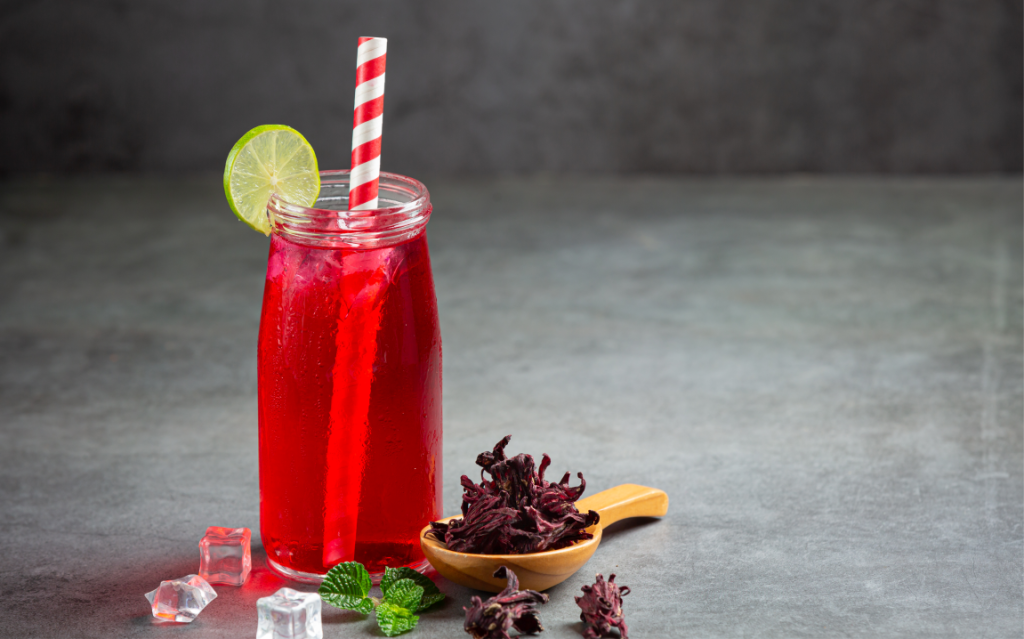
Ingredients
- 2 cups dried hibiscus petals (zobo leaves)
- 1-2 cups sugar (adjust to taste)
- 2-3 liters water
- 2-3 slices of fresh ginger
- 2-3 cloves
- Optional: pineapple peel, orange slices, or other fruits for added flavor
Instructions
Rinse the dried hibiscus petals thoroughly under cold water to remove any dust or debris.
In a large pot, bring the water to a boil and add the rinsed hibiscus petals, pineapple peel , ginger slices, and cloves.
Reduce the heat and simmer for about 15-20 minutes, allowing the flavors to infuse.
Remove the pot from the heat and strain the liquid through a fine mesh sieve or cheesecloth to remove the petals and spices.
Stir in the sugar while the liquid is still warm, adjusting the sweetness to your preference.
Allow the zobo to cool to room temperature before transferring it to the refrigerator to chill.
Serve the chilled zobo over ice and garnish with pineapple chunks, orange slices, or other fruits if desired.
Pro Tip: For an extra refreshing twist, you can add a splash of pineapple juice or orange juice to the zobo before serving!
KUNU ZAKI :
This is a traditional Nigerian drink made from grains, usually millet or sorghum. Kunu comes in two main varieties: Kunu Zaki (millet-based) and Kunu Gyada (sorghum-based). It has a slightly sour taste and is enjoyed chilled.
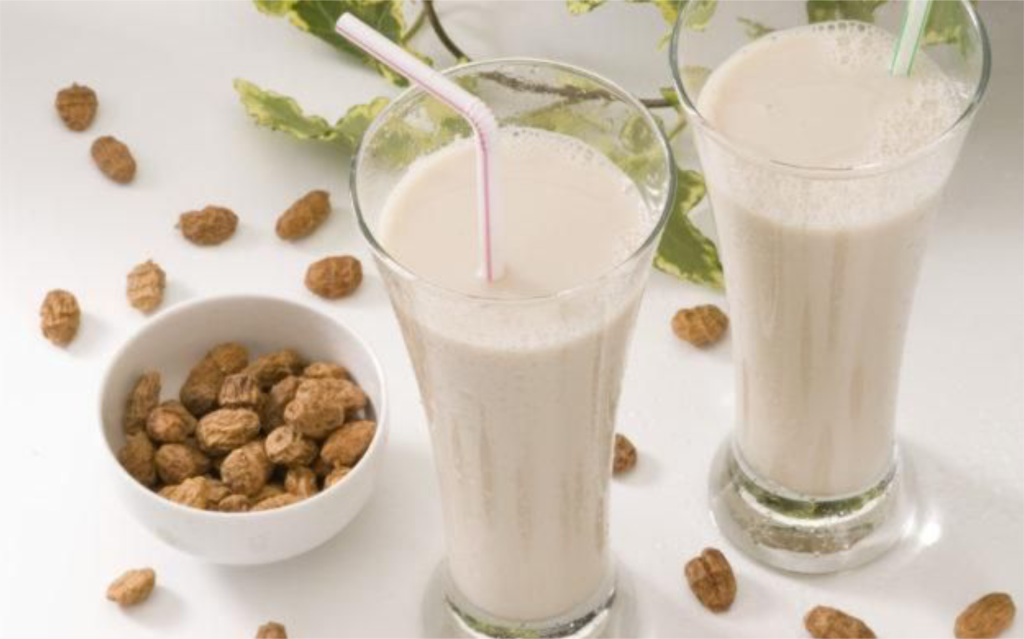
Ingredients
- 3 cups Millet
- 2 large fresh Ginger
- 3 large raw Sweet Potato
- 1 tbsp cloves
- Sugar or sweetener of choice
- Water
Instructions
To remove impurities, the millet should be washed completely and soaked afterwards for 24 hours.
Wash the gingers thoroughly, chop them into many pieces.
To grind, strain the soaked millet and set it aside in a mixture of ginger and cloves.
Cut your sweet potato into small cubes by slicing it. Keep the cubes of Sweet Potatoes under water for a while.
Blend the potato and millet mix separately into a paste-like texture with just enough water. You can blend at home if you have a powerful blender that’s 1000 watts above the ground or take it to a grind mill.
Use a cheesecloth or a sieve to separate the chaff then let it settle until the water on the top is clear.
Take out some water from the mixture, leaving enough to mix with the paste until it is light (*Do not discard the water).
Put some water in the pot and boil it.
Slow down the heat and pour the millet mixture slowly.
Stir continuously as though you are making pap (ogi/akamu/koko) Slowly stir in circular motions, and steadily until it thickens.
Keep the same pace stirring, if it looks too thick, loosen it up with the water you decanted from the millet paste.
Add water until the consistency is runny. Get the heat turned off. Set the millet to a slow boil and add the potato paste, stirring it properly.
Add your sweetener, store in a tightly covered bottled.
*Note : Some people prefer to make Kunu Zaki without sweet potato. What they do is split the millet mix into two halves. Cook one half and add the other half into the cooled cooked part. There is nothing wrong with that. You can try that instead.
Pro Tip: Kunu can be served plain or with additions like coconut milk, evaporated milk, or groundnuts for added creaminess and texture. Feel free to experiment with different variations to suit your taste preferences.
PALM WINE :
A popular traditional beverage, palm wine is tapped from palm trees. It can be enjoyed fresh or allowed to ferment for a fizzy kick. Palm wine is not only refreshing but also culturally significant in various Nigerian communities.
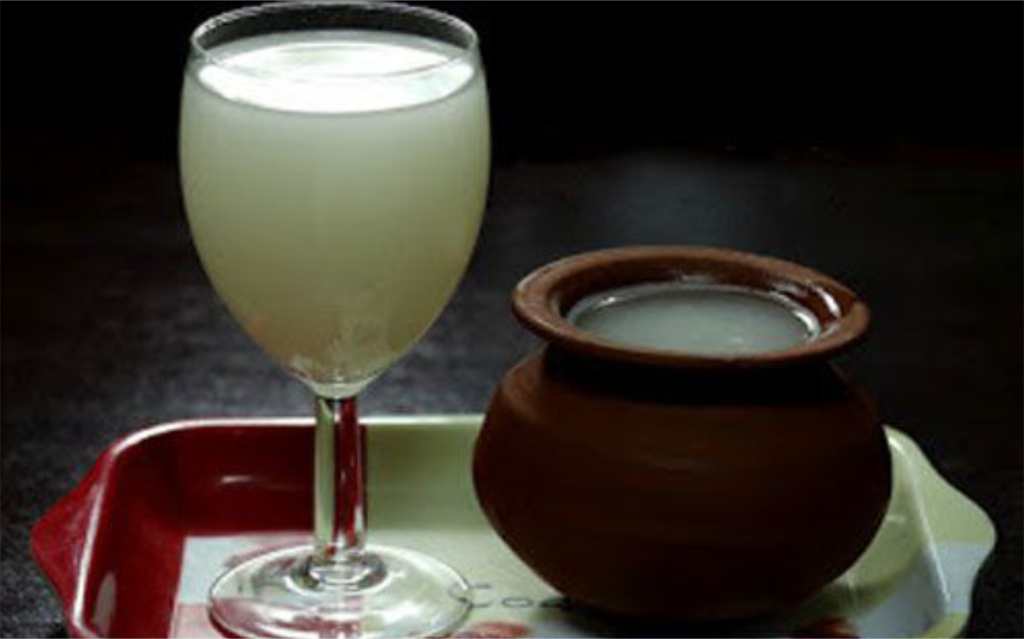
Ingredients
- Freshly tapped palm wine
Instructions
Harvest palm wine from palm trees using a tapping technique.
Strain the palm wine to remove any debris or impurities.
Serve the palm wine fresh and chilled for the best taste and experience.
Pro Tip: Palm wine can vary in taste depending on the species of palm tree and the fermentation process. It’s best enjoyed fresh for its sweet, mildly alcoholic flavor.
KOKUM JUICE :
Kokum juice is made from the fruit of the kokum tree. The deep purple drink has a sweet and slightly tangy flavor, making it a delightful choice for staying cool.
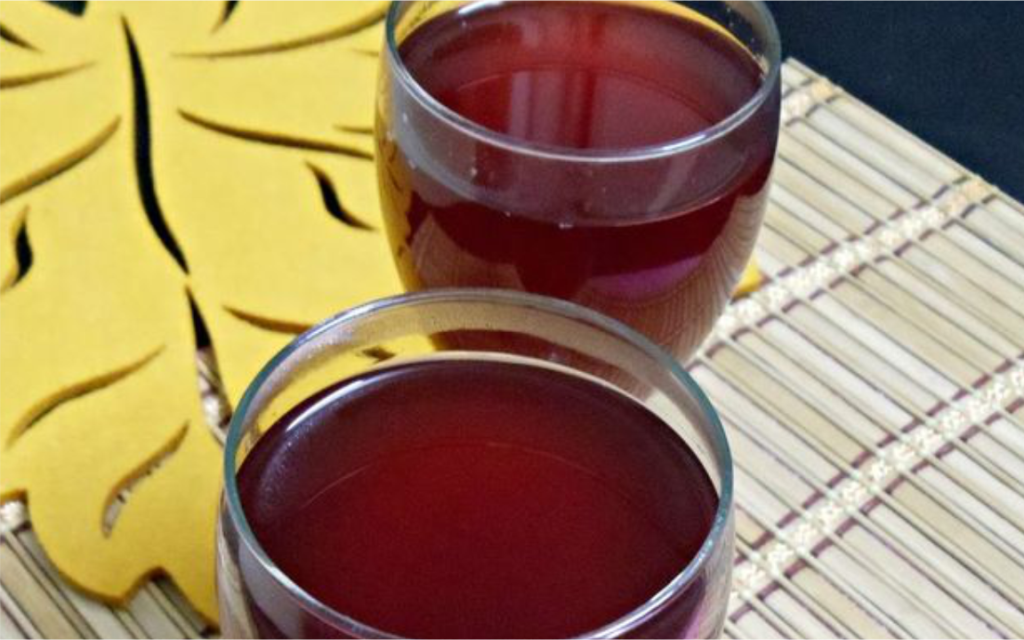
Ingredients
- 1 cup dried kokum peels
- 4 cups water
- 1/2 cup sugar or honey (adjust to taste)
- Juice of 1 lime or lemon (optional)
- Ice cubes for serving
- Fresh mint leaves for garnish (optional)
Instructions
In a saucepan, combine the dried kokum peels and water. Bring to a gentle boil, then reduce the heat and simmer for 10-15 minutes.
Remove the saucepan from the heat and let the kokum mixture cool to room temperature.
Once cooled, strain the kokum mixture through a fine mesh sieve or cheesecloth into a pitcher, pressing down on the peels to extract all the juice.
Stir in the sugar or honey until dissolved. Add the lime or lemon juice if using.
Refrigerate the kokum juice for at least 1 hour to chill.
To serve, fill glasses with ice cubes and pour the chilled kokum juice over the ice.
Garnish with fresh mint leaves for a pop of color and additional freshness, if desired.
Stir well before drinking and enjoy the unique and refreshing taste of kokum juice!
Pro Tip: Kokum juice can be stored in the refrigerator for up to 3 days. Shake or stir well before serving as the juice may settle over time.
TIGERNUT MILK (Kunun Aya) :
Tigernut milk is a sweet, nutty beverage made from tigernuts. It’s often sweetened with natural flavors like vanilla or cinnamon and served over ice for a cool, nutritious drink.
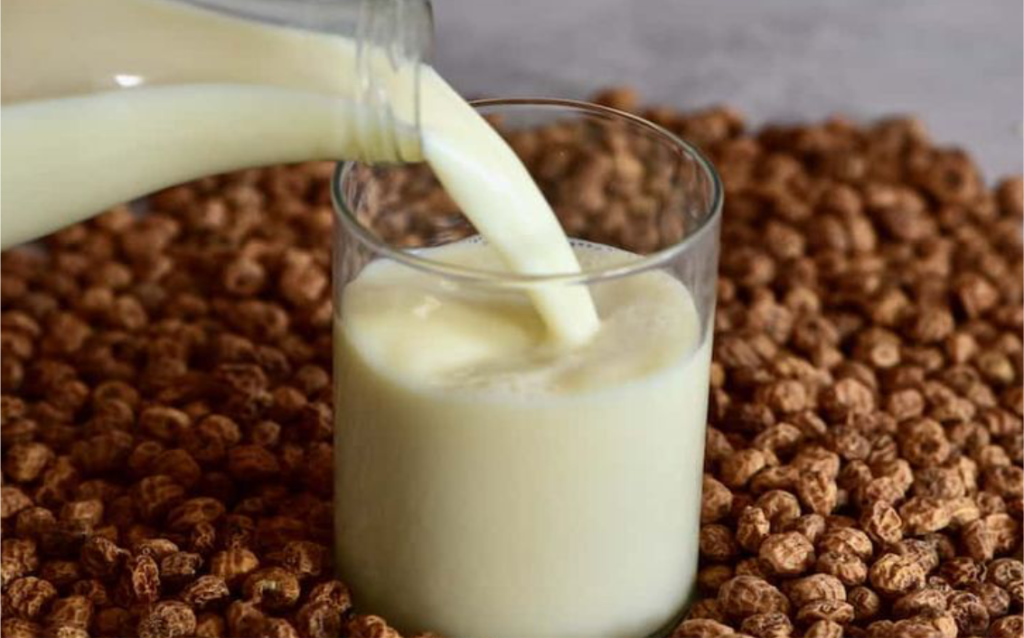
Ingredients
- 1 cup tigernut milk (tigernuts blended with water and strained)
- 1/2 cup coconut milk
- 1 tablespoon honey or sugar (optional)
- 1/2 teaspoon vanilla extract
- Pinch of cinnamon for garnish
- Ice cubes for serving
Instructions
In a blender, combine the tigernut milk, coconut milk, honey or sugar (if using), and vanilla extract.
Blend on high speed until the mixture is smooth and well combined.
Taste the tigernut milk and adjust sweetness if necessary by adding more honey or sugar.
Fill glasses with ice cubes and pour the tigernut milk over the ice.
Sprinkle a pinch of cinnamon on top of each glass for a warm and spicy aroma.
Serve immediately and enjoy the creamy and refreshing taste of the tigernut milk.
Pro Tip: You can enhance the flavor of the tigernut milk by adding a splash of almond extract or a sprinkle of nutmeg for an extra layer of richness.
HOMEMADE GINGER BEER :
While not exclusive to Nigeria, ginger beer is a common and popular homemade beverage. It’s made by fermenting ginger, sugar, and sometimes lemon, resulting in a fizzy and spicy drink.
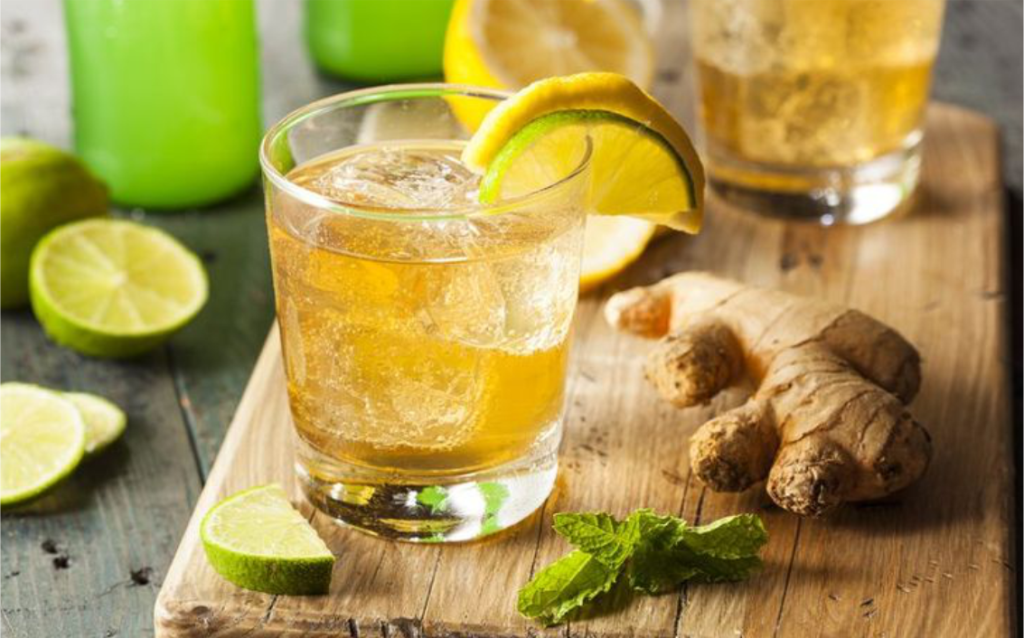
Ingredients
- 1 cup fresh ginger, peeled and thinly sliced
- 4 cups water
- 1 cup granulated sugar
- Juice of 2 lemons
- 1/4 teaspoon active dry yeast
- Additional water for dilution (optional)
- Ice cubes for serving
- Lemon slices for garnish
Instructions
In a saucepan, combine the sliced ginger and water. Bring to a boil, then reduce the heat and simmer for 10-15 minutes.
Remove the saucepan from the heat and let the ginger mixture cool to lukewarm.
Strain the ginger-infused water through a fine mesh sieve or cheesecloth into a clean pitcher.
Stir in the granulated sugar until completely dissolved. Add the lemon juice and stir to combine.
Sprinkle the active dry yeast over the surface of the ginger mixture and let it sit undisturbed for 10-15 minutes to activate.
Once the yeast is activated, stir the ginger beer mixture gently to combine.
Cover the pitcher loosely with a clean cloth or plastic wrap and let it ferment at room temperature for 24-48 hours, or until fizzy.
Once fermented, transfer the ginger beer to bottles and refrigerate to chill.
To serve, fill glasses with ice cubes and pour the chilled ginger beer over the ice.
Garnish with lemon slices for a citrusy touch.
Stir well before drinking and enjoy the spicy and effervescent flavor of homemade ginger beer!
Pro Tip: Adjust the sweetness and tartness of the ginger beer by adding more or less sugar and lemon juice according to your taste preferences.
HEALTH BENEFITS AND NUTRITIONAL INFORMATION
These drinks are not only delicious and refreshing but also offer a variety of health benefits. Below, we listed a few nutritional properties and potential health perks of the featured beverages.
ZOBO
Zobo, made from dried hibiscus petals, is rich in antioxidants, particularly anthocyanins, which may help lower blood pressure and improve heart health.
This drink is also high in vitamin C, which supports immune function and promotes healthy skin.
Additionally, the ginger commonly used in zobo may aid digestion and alleviate nausea.
KUNU ZAKI
Kunu Zaki is known to help reduce the risks associated with diabetes.
It prevents dehydration: Kunu drinks are very refreshing, especially in hot weather or during exercise. In addition, the high moisture content of kunu zaki makes it easier to replace water lost through sweat when exercising or in hot weather which reduces the risk of dehydration.
It’s good for your heart: millet contains magnesium and potassium, which help to reduce your blood pressure. In addition, some doctors have suggested that the vitamin B3 contained in millet could be important for producing good cholesterol.
It contains fiber, which helps to support the health of your digestion. The fiber helps to improve digestion and protection from gastrointestinal conditions such as constipation.
PALM WINE
Palm wine is naturally rich in potassium, an electrolyte essential for regulating blood pressure and supporting heart function.
It also contains trace amounts of vitamins B1 (thiamine) and B2 (riboflavin), which help convert food into energy and maintain healthy vision and skin.
Palm wine is lower in calories compared to other alcoholic beverages, making it a lighter option for those watching their calorie intake.
KOKUM JUICE
Kokum juice is low in calories and rich in antioxidants, particularly garcinol and hydroxycitric acid, which may have anti-inflammatory and anti-obesity effects.
It’s also a good source of vitamin C, promoting immune health and collagen production for healthy skin.
Consuming kokum juice may help support digestion and relieve acidity due to its alkalizing properties.
TIGERNUT MILK (Kunun Aya)
Tigernut milk is naturally dairy-free and rich in unsaturated fats, particularly oleic acid, which may help lower cholesterol levels and reduce the risk of heart disease.
It’s also a good source of fiber, promoting digestive health and helping to maintain a healthy weight.
Additionally, tigernuts contain vitamins E and C, antioxidants that protect cells from damage and support immune function.
HOMEMADE GINGER BEER
Ginger beer made with fresh ginger offers potent anti-inflammatory and antioxidant properties, which may help alleviate nausea, reduce muscle soreness, and support overall immune function.
It’s naturally caffeine-free and low in calories, making it a healthier alternative to traditional carbonated sodas.
Consuming ginger beer in moderation may aid digestion and soothe gastrointestinal discomfort, thanks to ginger’s natural carminative properties.
Note: While these traditional Nigerian drinks offer potential health benefits, it’s essential to consume them as part of a balanced diet and lifestyle. Moderation is key, especially for beverages containing added sugars or alcohol.
CULTURAL SIGNIFICANCE AND TRADITIONS
Traditional Nigerian drinks hold a special place in our hearts and gatherings. They’re more than just beverages; they’re a taste of our heritage and a symbol of community.
These drinks have been part of our celebrations for generations. Think of Zobo at weddings, refreshing and vibrant, or Agbo Jedi Jedi shared among family, believed to have healing powers.
Every region has its own unique flavors. In the North, you’ll find Kunu Zaki, creamy and comforting, while in the South, there’s Palm Wine, a symbol of camaraderie and joy.
Making these drinks is a tradition passed down from elders to the younger ones. It’s a way of preserving our culture and connecting with our roots.
Drinking these traditional beverages isn’t just about quenching thirst; it’s about sharing stories, laughter, and love. They bring us together, reminding us of who we are and where we come from.
FAQs AND TROUBLESHOOTING
Here are some common queries and troubleshooting tips to help you navigate the world of Nigerian beverages.
What are some common variations of traditional Nigerian drinks?
Traditional Nigerian drinks offer endless possibilities for customization. For example, you can experiment with different fruits, spices, or herbs to create unique flavor combinations. Consider adding mint leaves to Kunu Zaki or experimenting with different fruit juices to Zobo for a refreshing twist.
How should I store homemade traditional Nigerian drinks?
They should be stored in airtight containers in the refrigerator to maintain freshness and prevent spoilage. It’s recommended to consume them within a few days of preparation for the best flavor and quality.
What can I do if my drink turns out too thick or too thin?
If your drink turns out too thick, you can simply dilute it with additional water or fruit juice until you reach the desired consistency. Conversely, if it’s too thin, you can thicken it by simmering it gently on the stove until it reduces to the desired thickness.
Are there any health considerations or precautions to keep in mind when consuming traditional Nigerian drinks?
While these drinks can be refreshing and delicious, it’s essential to be mindful of any allergies or sensitivities to specific ingredients. Additionally, if using palm wine, ensure it’s sourced from a reputable source and consumed in moderation, as excessive alcohol consumption can have adverse health effects.
What are some creative ways to serve traditional Nigerian drinks for special occasions or gatherings?
They can be served in a variety of creative ways to elevate special occasions or gatherings. Consider serving them in decorative pitchers or glassware, garnished with fresh fruit slices, herbs, or edible flowers. You can also create themed drink stations with different traditional drinks for guests to enjoy.
How can I incorporate traditional Nigerian drinks into my everyday meals or snacks?
Traditional Nigerian drinks are versatile and can be enjoyed on their own or incorporated into various recipes. For example, you can use Zobo as a base for popsicles or sorbets, add Kunu Zaki to smoothies or oatmeal, or use Tamarind Cooler as a marinade for grilled meats or seafood.
Are there any vegan or dairy-free options for traditional Nigerian drinks?
Yes, there are several vegan and dairy-free options for traditional Nigerian drinks. For example, you can use coconut milk or almond milk as a substitute for dairy milk in a recipe like Kunu Zaki. Additionally, you can use alternative sweeteners like agave nectar or maple syrup for a vegan-friendly version of Zobo.
How can I incorporate traditional Nigerian drinks into non-alcoholic mocktails or cocktails?
Traditional Nigerian drinks can add depth and flavor to non-alcoholic mocktails or cocktails. Consider using Zobo as a base for a refreshing spritzer, mixing Kunu Zaki with fruit juices and sparkling water for a mocktail, or incorporating Palm Wine into tropical-inspired cocktails like a Palm Wine Mojito or Palm Wine Punch.

